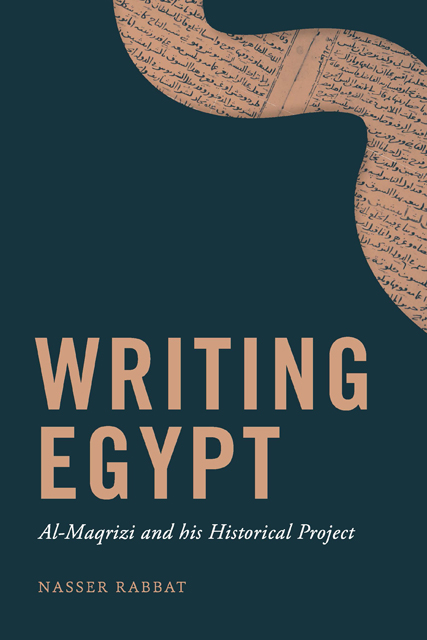Book contents
- Frontmatter
- Contents
- Preface
- List of Short References to Frequently Cited Primary Sources
- List of Abbreviations
- Notes on Transcription and Dates
- Introduction: A Singular Mamluk Historian
- Part 1 The Life of al-Maqrizi
- Part 2 The Writings of al-Maqrizi
- Part 3 The Afterlife of al-Maqrizi’s Writing
- In the Guise of a Conclusion: Becoming the Greatest Historian of Egypt
- Bibliography
- Index of Books Cited in the Text
- General Index
5 - Al-Maqrizi and the Orientalists
Published online by Cambridge University Press: 02 June 2023
- Frontmatter
- Contents
- Preface
- List of Short References to Frequently Cited Primary Sources
- List of Abbreviations
- Notes on Transcription and Dates
- Introduction: A Singular Mamluk Historian
- Part 1 The Life of al-Maqrizi
- Part 2 The Writings of al-Maqrizi
- Part 3 The Afterlife of al-Maqrizi’s Writing
- In the Guise of a Conclusion: Becoming the Greatest Historian of Egypt
- Bibliography
- Index of Books Cited in the Text
- General Index
Summary
When considered within his own intellectual tradition, al-Maqrizi appears almost as an anachronistic figure, both for his dedicated focus on the history of Islamic Egypt as a lifelong project (the Prophet Muhammad’s life story being the second one) and for the critical stance displayed in most of his texts, especially the Ighathat, Khitat, and Suluk. Certainly, no other Mamluk historian seems to have absorbed the Khaldunian perspective into his subject matter as al-Maqrizi did. Nor did any of his contemporaries capture the intensity of feelings displayed in his description of his country and city, his predictions of their ruination, or his persistent and steadily escalating denunciation of the Mamluk rulers of his time as primary responsible for that state of affairs. Nor was any other historian or khitat author creative enough to juxtapose the pedagogical and moral aims, common to all the period’s historians, with the typographical and architectural descriptions as al-Maqrizi did in his Khitat. Top annalistic historians such as Ibn Taghri-Birdi, Ibn Hajar al-‘Asqalani, al-Sakhawi, and even Ibn Khaldun himself sought their moral lessons in the actions of kings and holy men; al-Maqrizi located his in the marks of these actions on the face of the city, on its khitat and athar.Other contemporaneous or slightly later Mamluk khitat authors, such as al-Suyuti, Abu Hamid al-Qudsi, Ibn Iyas, and the Damascene Ibn Tulun al-Salihi, stopped at the level of Galtier’s utilitarian definition in their treatment of their material. They composed their books to preserve the actual memory of quarters and buildings.They all drew up dispassionate inventories of quarters, streets, and buildings. But they did not use their compilations to advance a larger agenda, as al-Maqrizi did. Many, in fact, copied or summarized sections of al-Maqrizi’s Khitat and commented on or added updated information to them, with no underlying historical awareness or emotive charge.Their khitat books are informative, of course, but they deliberately—or, more likely, conformingly—stay at the level of documentary and descriptive presentations, dodging the engagement of their reader in their motivations, concerns, or agendas.
In contrast, al-Maqrizi’s Khitat comes across not just as an invaluable historical source but also, and perhaps more powerfully, as an overtly emotional urban history laced with political innuendos, sociocultural proclamations, and an intense filial affinity with the city and the country.
- Type
- Chapter
- Information
- Writing EgyptAl-Maqrizi and his Historical Project, pp. 205 - 233Publisher: Edinburgh University PressPrint publication year: 2023



